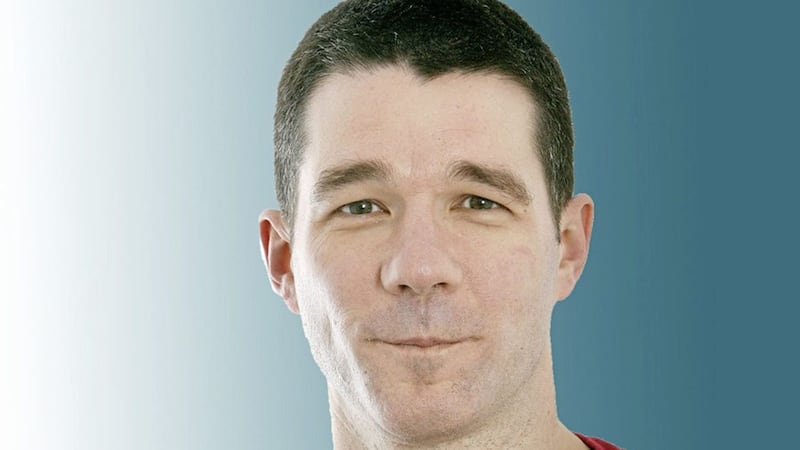Journalists are not above the law but the priorities of the law are not above criticism. The huge arrest operation against journalists Trevor Birney and Barry McCaffrey, questioned over documents allegedly stolen from the Police Ombudsman, stands in obscene contrast to the unsolved Loughinisland massacre - a policing scandal both men exposed in their No Stone Unturned documentary.
In Northern Ireland, one unsolved sectarian atrocity is too readily compared with others - whataboutery the authorities can count on to get away in the smoke.
So consider a different comparison. Birney made the award-winning 2004 UTV Insight programme that exposed the death of five children in Northern Ireland hospitals. This led to the hyponatraemia inquiry - the longest inquiry in UK history and one of the most damning. Its judicial chair found medical professionals and NHS bodies had engaged in “deceit” and “cover-up” and had “deliberately concealed” information from the inquiry and the coroner. Some of these findings were due to documents leaked by a whistleblower.
In May, four months after the inquiry concluded, bereaved relatives finally extracted a promise from the PSNI to investigate its findings. Will this also lead to dawn raids on homes, searches of offices, seizure of phones and computers and arrests for lengthy questioning? If not, why not?
**
Chief Constable George Hamilton has sought to distance the PSNI from the theft investigation, explaining it is run by Durham Police, who he brought in to avoid perceived conflicts of interest. Yet lawyers for Birney and McCaffrey say over 100 PSNI officers took part in the arrests and searches, the PSNI issued one of the warrants and PSNI officers participated equally in the questioning.
At least the PSNI’s Cyber Protection unit was out of the loop. A 10am on the morning of the arrests, presumably oblivious to the unfolding farce, it tweeted: “How would your business cope with a loss of records? Always remember to secure your data”.
**
The RHI inquiry has resumed, with testimony so remarkable it is easy to miss extraordinary details. For example, senior civil servant Andrew McCormick has made a written claim that DUP former minister Jonathan Bell “covertly” recorded their meetings, admitted doing the same to party colleagues and believed he was entitled to record conversations.
McCormick said DUP minister Simon Hamilton and a DUP special adviser told him they also suspected his meetings with Bell had been “secretly recorded”. McCormick “understood that the suggestion was that Jonathan Bell had previously acted in the same way in some other context or contexts”.
Bell was minister at the department responsible for RHI for one year. His context before that was spending four years, from 2011 to 2015, as junior minister in the office of the first and deputy first ministers.
What else might the DUP know or fear he has on tape?
**
Amid all the fuss over secretary of state Karen Bradley cutting MLAs' pay, it has barely been noticed she has is about to formalise indirect rule. Announcing the pay cut, Bradley also promised legislation giving “clarity and certainty” on what decisions civil servants can make without ministers, plus legislation in October setting aside the need to call another Stormont election in the absence of an executive.
The pay cut is in two stages, immediately and in November, hinting at a timeframe to restore devolution. However, indirect rule can now last indefinitely.
**
The Health and Social Care Board has told a Westminster committee there are 1,800 unfilled NHS posts in Northern Ireland, with medical specialists particularly hard to recruit due to pay differentials with Britain. Trade union Unison says the figure is closer to 3,000 including nurses, porters and cleaners.
A related issue - certainly at professional level - must be the unofficial closed shop in Northern Ireland’s self-contained NHS. With just one medical school and a small number of hospitals that every doctor rotates through during their protracted training, a culture has developed of local jobs for local people, defended by practical as well as psychological barriers. Throwing money at this problem will never be enough.
**
The Boundary Commission for Northern Ireland has submitted its final proposals to the government, detailing how 18 Westminster seats and their corresponding assembly constituencies will be reduced to 17.
Sinn Féin is unhappy but has limited grounds for complaint, having forgotten to engage with the consultation exercise. The proposals have been drafted by a judge-led independent panel applying objective geographic criteria, so crying “gerrymander” sounds Gerrymad.
Instead, Sinn Féin is complaining the proposals will leave “at least four” constituencies without nationalist MPs or MLAs - although there are four such constituencies already. Has it forgotten that too? And would any fix not be gerrymandering by definition?
**
Trade union Unite has taken a strong stand this year in defence of Belfast’s new Glider bus system, reminding critics and commercial rivals that this is a major public investment in public transport to serve and employ working people.
If only all comrades had such solidarity. Belfast City Council has no remit over Glider, yet People Before Profit councillor Matthew Collins has proposed a motion demanding Glider lanes be curtailed due to “adverse impact on businesses”. Is that not profit before people?
newton@irishnews.com









